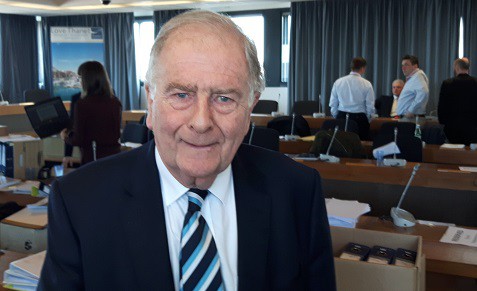
I was talking to the Daily Mirror’s Kevin McGuire last week about the ‘snap’ election and we agreed that it was only a matter of time before people, and most particularly journalists and pundits, would be claiming that “of course I knew that there was going to be an early election. It was obvious.”
Many things are ” obvious” with the benefit of 20- 20 hindsight but I know of nobody, outside a very small and tight circle of trusted confidantes, who knew before last mid-Tuesday morning that Theresa May was going to walk out of Downing Street and tell the nation and the world that she was going to seek parliamentary approval to over- ride the ” five year rule” established under the Fixed Term Parliaments Act and hold a General Election on June 8.
Surprise
Friends and family rang me to ask what the Prime Minister was going to speak about in her Downing Street statement and I had to confess to total ignorance. I was taken completely by surprise and so, I suspect, were about half of the members of the Cabinet, all backbench and opposition Members of Parliament and just about everyone else, including the BBC and Sky News political commentators.
Looking back, the writing was on the wall of course. Most Prime Ministers do not bother to observe the lessons of history but Theresa May clearly is the exception to that rule.
Rebellion
John Major’s 1992 Government was effectively bereft of a majority following the rebellion of some members of our own Party. That made anything resembling strong decision-making impossible, played havoc with the lives of those of us who were present during that parliament and gave rise to the accusation that the Prime Minister was in office but not in government.
Gordon Brown was expected to call an early General Election when he took over from Tony Blair as Prime Minister but he lost his nerve, bottled out and paid the price at the ballot box in 2010.
Mrs May has clearly taken heed of those messages. She has, since taking office, been bedeviled by the hard-Brexiteers and the equally die-hard Remainers in the House and that, coupled with no majority at all in the House of Lords, has made government in general and the prospect of negotiating a successful separation from the European Union , very challenging.
Ambulance
The hardest job in Government, apart from hers, has been that of the Pairing Whip whose task is to try to ensure that the Government has a majority in the voting lobby at all times. There have indeed been occasions when the very sick have been brought by ambulance to the House of Commons to vote.
Mrs May is a woman of her word but she also has a job of work to do as Prime Minister of a United Kingdom preparing a good deal for Brexit and at the same time managing policies and a strong economy that will deliver the healthcare, social care, education, defence and infrastructure that the people of Britain have a right to demand.
When she said that she intended to see the 2015 parliament through to 2020 she clearly meant it but events and circumstances have compelled her to play a different hand.
The right thing
Her decision to call an election and to seek the majority and the authority to do the job properly, both at home and abroad, was in the interests of the United Kingdom, difficult, courageous and absolutely right.
As the Prime Minister told the House of Commons on March 29 during her statement on the triggering of Article 50 “at moments like these- great turning points in our national story – the choices we make define the character of our nation”.
We have just such a choice on June 8 and, as someone else might have said, “Let us give her the tools to finish the job”.
Believe in Britain and that, with the right person in Number Ten, our best days lie ahead.

